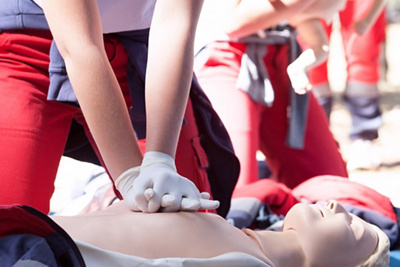Becoming an emergency care provider in the pre-hospital setting requires intense study.
You need to have passed maths, science and biology as matric subjects in order to be eligible for the three types of courses currently available.
Apart from rigorous study, paramedics also need to be prepared to challenge themselves when it comes to physical fitness and rescue training. “Becoming an emergency care provider requires perseverance and commitment,” says Ryan Wills, Training Manager: Emergency Medical Care. “It’s definitely not just a job, it’s a calling.”
There is a three-tiered structure, aligned to the South African National Qualifications Framework, when it comes to education and training in the emergency care profession. All pre-hospital emergency care training institutions and courses are accredited by the Council on Higher Education and the Health Professions Council of South Africa (HPCSA).
“The most important thing is to study,” says ER24 Southern Cape Branch Manager Tao Carstens. “Do your research, decide which course is the most appropriate for you and always ask questions! Try to learn from as many people as possible in order to develop and grow. You want an enjoyable career path that allows you to thrive, grow and help others.”
Entry level
The entry-level emergency care qualification is a National Qualifications Framework (NQF) level 5, 120-credit Higher Certificate in Emergency Medical Care. This one-year programme qualifies you as an Emergency Care Assistant, meaning you are able to perform fundamental emergency skills and provide a limited scope of medication. Graduates practice primarily on ambulances within South Africa in rural and urban contexts that range from sophisticated emergency medical care facilities to remote primary healthcare settings. This programme also aims to promote an understanding of the multidisciplinary approach to effective, efficient patient care. Selection is based on academic merit; a structured personal interview; phobia evaluation; medical examination; physical fitness and swimming proficiency evaluation; an English proficiency evaluation; and previous appropriate experience (a recommendation). This qualification is offered by Mediclinic Private Higher Education Institution in Cape Town, and other institutions of higher learning across the country.
Intermediate level
The next qualification is an NQF level 6, 240-credit Diploma in Emergency Medical Care. The two-year course outline includes Mental Health and Wellness; Foundations of Professional Practice; Anatomy; Physiology; Integrated Sciences (Chemistry), and Integrated Sciences (Physics). This mid-level qualification enables you to register as a paramedic and equips you to perform advanced clinical procedures such as advanced airway management and advanced cardiac life support, and provide a wider scope of medication. Paramedics often work with Emergency Care Assistants in an ambulance. This qualification is offered by Mediclinic Private Higher Education Institution in Cape Town, and other institutions of higher learning across the country.
Highest level
A four-year NQF level 8, 480-credit professional Bachelor of Emergency Medical Care degree is currently the highest qualification. Graduates of this degree are qualified as Emergency Care Practitioners and able to provide the highest level of pre-hospital emergency care available. This advanced scope of practice requires a high level of medical knowledge to make critical diagnostic decisions, using the latest scientific evidence, to administer medicines and perform invasive clinical procedures on the most critically ill or injured patients. Contact the university of your choice for further information on costs as well as entrance requirements.
For more information on the Emergency Medical Care programmes offered at Mediclinic’s registered Learning Centre, please visit the Mediclinic website.


